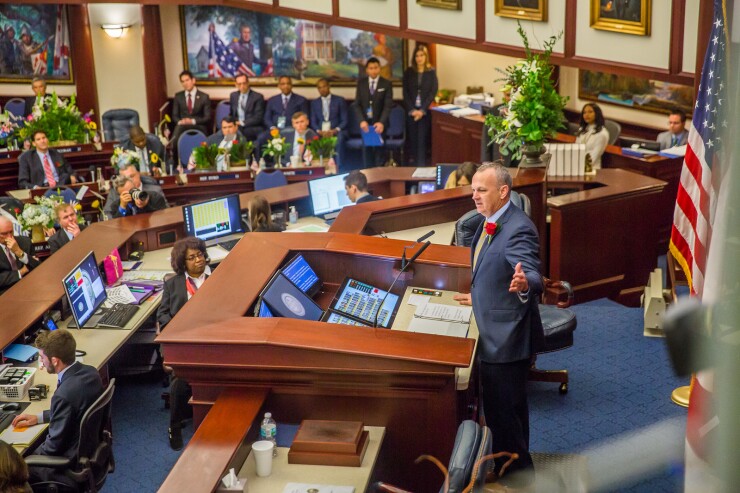Florida is a microcosm for education portfolios around the U.S. experiencing competition for funds, and in some cases, a stifled revenue-raising environment, according to S&P Global Ratings.
The state’s population and enrollment growth has been supported by steadily increasing state and local funding overall, S&P said in a report on education funding trends Tuesday. However, funding has shifted in recent years due to policy changes, and the increasing momentum of school choice expansion.

“We believe there could be adversarial relations between public school districts, which predominantly serve as authorizers, and charter schools,” said analyst Jennifer Garza. “While no ratings have changed as a direct result so far, we continue to monitor these evolving funding shifts for potential credit effects.”
Charter schools are growing in number and enrollment across the nation and Florida is among the states with the largest charter school sector growth.
“We believe the state's shift in capital funding adds a layer of uncertainty to financial forecasting for public schools while benefiting charter schools,” Garza said. “If a public school maintains marginal reserves and lacks budgetary flexibility, credit quality could be pressured over the medium-to-long term, whereas charter schools may gain flexibility and reserves.”
Traditional public school districts in Florida have challenged in court various bills passed by state lawmakers since the early 2000s, as the Republican-led Legislature ramped up efforts to expand school choice and the use of vouchers.
A recent legal battle was the result of the passage of House Bill HB 7069, a 2017 law championed by then House Speaker Richard Corcoran, R-Land O’ Lakes.
The bill, signed into law by former Gov. Rick Scott in June 2017, required Florida school districts to distribute a portion of their discretionary ad valorem tax revenues to charter schools within their districts.
The Florida Department of Education used a statutorily mandated methodology to determine the amount of capital outlay millage revenues districts had to provide to charter schools.
The Palm Beach County school board said in its unsuccessful lawsuit that sharing the state-mandated revenues would cost the district about $8 million in fiscal 2018. “These funds were previously earmarked for capital projects at traditional public schools within the district,” the district’s complaint said.

After Ron DeSantis was elected governor, but before he officially took office Jan. 8, he recommended that Corcoran become the commissioner of the DOE. The DOE board voted unanimously to appoint Corcoran on Dec. 17, 2018.
Corcoran said he envisioned pursuing DeSantis’s educational priorities, which included increasing school-choice options.
The state's charter schools allow students and their families to select from an array of kindergarten through 12th grade education choices, such as public and private schools and home schooling, suited to their needs, S&P said.
While those choices haven’t had a measurable impact on school districts’ credit ratings, Garza said S&P recognizes the inherent conflict with traditional public schools.
“We continue to monitor enrollment and funding trends, and acknowledge that charter-school expansion may cause future credit challenges, particularly for those districts with limited capacity to cut expenditures,” she said. “At a minimum, we view the increased competition for state funds as a potential factor that may add uncertainty to the budgetary process for traditional public schools.”





